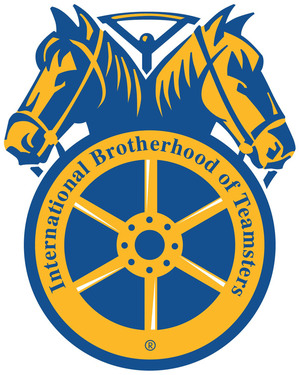Triumph over Global Employer Toll Group Fuels Hope for More U.S. Workers Organizing to End Low Wages, Poor Conditions in Retail, Food, and Supply Chain
LOS ANGELES, Jan. 10, 2013 /PRNewswire-USNewswire/ -- A set of truck drivers who haul shipments of imported merchandise from our shores to America's brand name stores will kick start 2013 with a raise that doubles their hourly pay. The extra $6+ change is part of a first-ever contract that shifts a bulk of their health care costs to their employer, grants overtime, paid sick leave and holidays, offers guaranteed hours and other terms for job security – not to mention a pension plan. The collective bargaining gains in an otherwise union-free private sector rival 21st century agreements in long-organized markets.
(Logo: http://photos.prnewswire.com/prnh/20100127/IBTLOGO)
"Justice…it's sort of indescribable and overwhelming to finally have the American Dream at our reach," said Jose Ortega Jr., a driver for global logistics giant Toll Group who served on his co-workers' bargaining committee along with representatives from the International Brotherhood of Teamsters/Local 848 in Long Beach, Calif. The Australian corporation operates at port complexes on both U.S. coasts and handles accounts for Guess?, Polo, Under Armour, and other sportswear lines sold at big box and department retailers like Walmart and JC Penney.
The Toll drivers' efforts mirror the collective action that has recently erupted in retail and fast food chains. The landmark agreement culminates more than 24 months of worker struggle and employer resistance in which these truckers – aided by a community coalition, their children, and clergy – borrowed bullhorns, leafleted consumers, gathered signatures, practiced their picket lines, staged noisy protests, and crashed shareholder meetings in a dogged campaign to end the Third World working conditions they once endured.
U.S. port drivers are the most underpaid in the trucking industry: A typical professional earns $28,873 a year before taxes. Their net incomes often resemble that of part-time or seasonal workers though they clock an average of 59 hours a week. They possess specialized skills and licensing to safely command an 80,000 lb. container rig, but they fit the profile of America's working poor. Food stamps, extended family, or church pantries are needed to get by; their children often lack regular pediatricians or only receive care at the public ER.
With American wages in freefall due to the imbalance of power enjoyed by multinational corporations, the scope and significance of such a labor accord with a transportation titan that operates in some 55 countries is a jaw dropper alone. What observers further find remarkable: The 65 workers who secured these middle-class benefits with their $8 billion employer are blue-collar Latino-Americans who hold jobs within a deregulated, virtually union-free industry at the ports.
"It upends the common wisdom that a workforce that lacks rights on the job cannot build the strength to take on the Goliaths of the global economy. But these drivers, like the workers at the warehouses and Walmart and Wendy's, cannot raise families on such low wages, so they are coming together to rewrite the playbook," noted Dr. John Logan, the director of Labor and Employment Studies at the College of Business at San Francisco State University. "The faces of this new movement are ordinary parents and churchgoers and community members who value the influence of a local priest as much as the expertise pouring in from strong trade unions overseas. Not only do they have the guts to strike – they have the faith they can win."
Their collective resolve paid off. Mr. Ortega, a single father who works the night shift, will see his new per-hour rate of $19.75 reflected on his next paycheck, along with any overtime that will now be paid at a time-and-a-half rate of $28.
"As a truck driver, I wanted the assurance that things would be okay for my daughter if I was injured, that I could take her to see the doctor if she got sick," the 36-year-old explained. "When we started organizing ourselves, we weren't asking for anything out of this world. Dignity. A fair day's pay for a hard day's work. Decent, sanitary facilities to make a pit stop, rest, eat…you know, to perform our jobs safely.
"But we knew winning respect would take a fight at every turn. So if we were afraid to lose our jobs, we asked our allies for help. When it was time to take action, we prayed for courage to speak out. And we always stuck together, and never gave up."
Elected leaders quickly praised the union contract as both a middle-class builder and noted its high-road business merits.
"We're talking about the men and women who are the backbone of our regional and national economy, yet they have never shared in the prosperity of the corporations they make so profitable," said Los Angeles Councilman Joe Buscaino, whose district includes the largest port in America. "The standards that Toll Group, its workers, and Teamsters Local 848 set make it possible to reward and attract responsible port businesses that want a level playing field to compete on innovation and quality, rather than who can pay Los Angeles' vital workers the least."
Contract Highlights include (Click here for a full summary & graphic comparison):
Fair wages –The day shift hourly rate increased from $12.72 to $19, and the night shift hourly rate from $13.22 to $19.75. In addition to the over $6/hour increase in hourly pay rates, drivers won $0.50/hour per year raises over the life of the contract, giving Toll port drivers over a 60% hourly wage boost over the life of the 3-year contract. Overtime pay of time-and-half kicks in after a typical full time 40 hour week, which is extremely rare in an industry where truckers are exempt from federal overtime laws and an average week hovers around 60 hours.
Secure retirement –Prior to the contract, less than a dozen Toll drivers could spare any extra dollars, even pre-tax, to participate in the corporate 401(k) plan. As Teamster Local 848 members, they have been automatically enrolled in the union's Western Conference Pension Trust. Such a retirement plan at the port has rarely been seen since trucking was deregulated in 1980. Toll will make a pension contribution of $1/hour per driver until 2014, and a $1.50/hour per driver by 2015.
Affordable health care – The Toll Group health care plan was financially out of reach for most of its truck drivers. The few who managed to meet the premium, deductibles, and copayments will now keep significantly more money in their pocket without sacrificing coverage, and the rest of their co-workers finally have access to quality, affordable health insurance coverage, including dental and vision care. The company will pay 95% of the premium for individuals and 90% for family coverage. Drivers who previously had to shell out $125/month for individual or $400/month per family will drop to roughly $30 or $150, respectively.
Stable work hours and paid time off – Most truck drivers lose a day's pay if they cannot work, are penalized by dispatchers for being unable to haul a load, and lack paid sick or holiday leave, making it stressful for family budgets and planning. But Toll drivers made substantial gains in all these areas. They will receive seven paid holidays, three paid personal days, and six paid sick days annually. They will accrue one or two weeks of vacation within the first two years of service, with longtime employees earning up to a month. They can also bank on guaranteed full- or half-day of pay regardless of seasonal slowdowns if they are scheduled to work.
Competitive growth incentives to raise market and living standards – The agreement establishes a high-road business model that recognizes Toll's competitors have not yet embraced fair wages and conditions. Provisions to encourage a level playing field and wide-scale unionization allow drivers to re-negotiate more gains when a simple majority of the regional market is organized.
"We commend these truck drivers for their leadership in challenging the status quo at the ports. Workers everywhere are standing up to say enough to poverty wages, and Toll drivers have demonstrated that working families will fight for middle-class paychecks in America," said Teamsters General President James P. Hoffa.
"For too long companies in the global supply chain have gamed the system by undercutting U.S. businesses that actually create good jobs. Toll Group and its drivers have raised the bar for responsible competition, and the Teamsters will not stop until the rest of the nation's port drivers have a shot at the American Dream."
Additional Background
The landmark contract caps over two years of struggle for union recognition that workers took online, to the truck yard, and in the LA streets; they zig-zagged to other U.S. seaports to shore up support, and even continent-crossed to meet their Aussie union workmates who stood in solidarity at their joint employer's doorstep.
In so doing, this group of Latino immigrants became an unlikely symbol of hope for their underpaid counterparts – union and not-yet-union, working in an adopted homeland as well as American-born workers – who must endure low-wage jobs in other profitable sectors in the U.S. food, retail, and global supply chain industries.
"We may work in the warehouses, but we all put in long and hard hours to make the big corporations rich, while we struggle to keep food on the table. Port truck drivers are our friends, our neighbors. They are even like our co-workers," said Javier Rodriguez, who works for Walmart's Riverside County warehouse subcontractor, NFI. "They are proof that having a good job in the supply chain is more than a dream if we dare to unite together, and demand a better future for our children."
The victory is also being celebrated across the Pacific Ocean where the Melbourne-based Toll Group employs some 12,000 of Australian drivers united in the Transport Workers Union (TWU). The members view their U.S. counterparts as their "workmates" and have supported the port drivers from Day One to ensure that as Toll enters new global markets, the company replicates the constructive labor-management relations that made it so profitable Down Under.
"We couldn't be prouder of our mates in America. From the beginning we said 'your fight is our fight' and today we say your victory is our victory," said TWU Acting National Secretary Michael Kaine. "The standards of fairness and respect for workers should be upheld by Toll no matter where they operate. The message to industry is clear, in this global economy workers and unions across continents are already in alliance with each other and we will continue to support one another until we have a strong voice in our workplaces everywhere."
The newly-inked contract with the Teamsters further gives another shot in the arm to the movement of port drivers fighting to overcome "misclassification" – illegally denying workers W-2 employment and benefits, a scam that keeps the American Dream out of their reach. Workers are coming forward with evidence for state and federal authorities as part of a coast-to-coast multi-industry crackdown on employers who disguise their employees as independent contractors to evade taxes, commit wage & hour violations, and quell unionization. The controversial practice is widespread in the deregulated trucking sector.
See here for an infographic and a summary of the contract. For more background on the Toll drivers' campaign for justice, visit their website . Information on the blue-green coalition behind the nationwide movement to drive up worker standards and clean up U.S. seaports can be found here: www.CleanAndSafePorts.org.
SOURCE International Brotherhood of Teamsters
WANT YOUR COMPANY'S NEWS FEATURED ON PRNEWSWIRE.COM?
Newsrooms &
Influencers
Digital Media
Outlets
Journalists
Opted In





Share this article